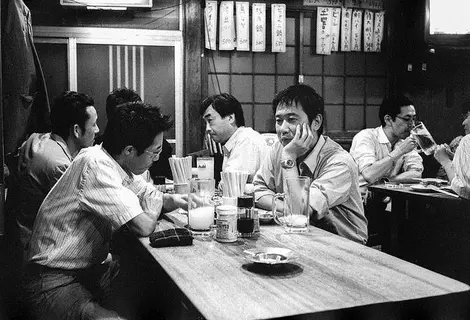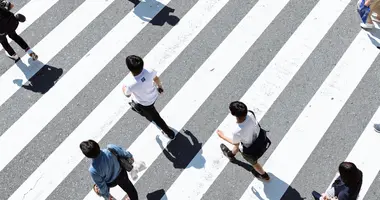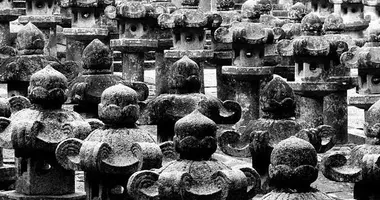Nomikai, Japanese evenings for colleagues to drink and relax
Nomikai (飲み会), which literally means "drinking get-togethers", are a veritable social phenomenon in Japan. These evenings with friends or colleagues usually take place in izakayas, typical bar-restaurants where beer, sake and small dishes are shared. If an invitation to a nomikai from your boss is hard to refuse, these gatherings are an opportunity to strengthen ties and relax in a convivial atmosphere, punctuated by the famous "kanpai!" toast. At the end of the evening, the bill is cleverly divided, with the younger guests paying less than their elders.
Izakayas, the preferred venue for nomikai
Most nomikai are held in izakayas, popular and convivial bar-restaurants. They serve a wide variety of alcohols (beer, sake, shochu...) and small dishes to share (yakitori, edamame, karaage...). The atmosphere is relaxed and conducive to conversation, far removed from the more formal atmosphere of the office. Salaried workers love to meet up after work to unwind with colleagues.
Izakayas are open late into the evening, and it's not uncommon to come across groups of merry revelers late into the night, especially in lively districts such as Tokyo's Shinjuku or Osaka's Namba. With their traditional decor, typical tableware and subdued lighting with paper lanterns, these establishments immerse their customers in a 100% Japanese atmosphere. The hustle and bustle of conversation and laughter, punctuated by the "sumimasen!" of waiters slaloming between tables, give these places their authenticity.
A typical nomikai evening
A nomikai usually begins at the end of the day, after work. Participants gather at the izakaya reserved for the occasion, where tables are assigned to them. The chef or organizers often make a brief speech to thank the guests and kick off the festivities. Everyone then toasts, shouting "kanpai!", the Japanese equivalent of "cheers!
What follows is a joyous moment of sharing, with glasses being filled and emptied to the rhythm of the passing dishes. It's customary not to refill one's own glass, but to rely on one's neighbors to refill one's glass, creating a wonderful sense of complicity. Discussions are lively, in a relaxed atmosphere that contrasts with the usual formalism of Japanese offices. It's an opportunity for employees to get to know each other better and exchange ideas in a more informal setting.
After a few hours of drinking and camaraderie, the official nomikai comes to an end. The bill, paid in unequal shares according to age and position, brings the moment to a close. But for some party-goers, the evening is just beginning! The most motivated continue with the "nijikai" (2nd meeting) or even the "sanjikai" (3rd meeting), in other bars, to prolong the party late into the night.
Social pressure around nomikai in the workplace
While nomikai with friends are a great way to have a good time, those organized in a professional setting can sometimes feel like an obligation. In traditional Japanese corporate culture, it can be frowned upon to decline an invitation from one's superior to go out for a drink. In a way, it's part of the job and reinforces team cohesion.
This social pressure can weigh heavily on some employees, who may not appreciate having to sacrifice their evenings to socialize with their colleagues. The tacit obligation to drink alcohol also raises questions. While most participants willingly lend themselves to the exercise, others would sometimes just like to go home. Companies are becoming increasingly aware of this issue, and the mentality is gradually evolving towards greater flexibility.
But for many Japanese, especially the older ones, the nomikai remains an essential part of business relations. Drinking together is seen as a way of strengthening bonds and facilitating communication within teams. "Nommunication" (contraction of "nomu", drinking, and "communication") is the key word. Under the influence of alcohol, we dare to say what's on our minds, iron out differences and understand each other better.
Nomikai, a Parisian restaurant inspired by the izakaya spirit
Inspired by the warm, friendly atmosphere of izakayas, Bérangère Boucher opened her Nomikai restaurant in Paris's 12th arrondissement in 2018. As in Japan, you can enjoy small plates to share, but here revisited with local French produce and a touch of creativity. The chef offers a market cuisine tinged with influences from around the world.
The establishment has been designed as a place to live and share, where you can come with friends, family or colleagues to have a good time. The uncluttered, contemporary decor, with its touches of raw wood and vegetation, creates a warm atmosphere. On the shelves, bottles of still wine and sake invite you to taste them. There's no soda here, just a selection of natural beverages, perfect for accompanying dishes made with fresh, seasonal produce.
Portrait of Bérangère Boucher, chef at Nomikai Paris
Before opening her restaurant, Bérangère Boucher had several professional lives. An editor for ten years, she gradually developed an all-consuming passion for cooking. At first, as a dilettante, making bentos for her lunch break, watching cooking shows or trying out new recipes at home. Then the urge grew stronger. In the end, she took the plunge and did some serious training to change her career path.
After obtaining a CAP in cooking, Bérangère worked in various establishments (caterers, bistros, gourmet restaurants...) to learn from experienced chefs and complete her career path. In particular, she worked with Brice Morvent, a chef renowned for his creative cuisine blending tradition and modernity. On the strength of these varied experiences, she went on to work as a home chef for 4 years, before deciding to open her own restaurant.
It was in 2017, during a trip to Japan, that something clicked for Bérangère. Seduced by the atmosphere of the izakayas, she wanted to recreate this friendly atmosphere in Paris. The idea for Nomikai was born: to offer bistronomic cuisine based on exceptional products, in a warm and relaxed setting. The decor and concept were worked on down to the last detail, and the restaurant finally opened in February 2018, to the delight of taste buds in the 12th arrondissement.
Customer reviews of Nomikai
Since its opening, Nomikai has won over the hearts and stomachs of many customers, delighted to enjoy a quality culinary experience in a relaxed atmosphere. Opinions are unanimous on the fresh, tasty products, prepared with creativity and generosity by the chef. The pleasant setting and attentive service are also praised.
Many appreciate the concept of small plates to share, reminiscent of the convivial spirit of Japanese izakayas and conducive to discovery. The possibility of tasting different dishes allows diners to travel through flavors and textures. Wine lovers are also won over by the sophisticated selection of natural vintages, perfect for accompanying gourmet bites.
Customers praise Nomikai's excellent value for money, where you can eat divinely well without breaking the bank. Many speak of a "super address" where it's a pleasure to return to enjoy the chef's inspired cuisine and the infectious good humor that reigns in this small, cosy restaurant, ideal for spending time with friends or family.
Practical information about Nomikai restaurant in Paris
Nomikai is located in the 12th arrondissement of Paris, close to Gare de Lyon. The restaurant is open from Wednesday to Sunday evenings, with continuous service from 7pm to 11pm (last order at 10pm). Getting there couldn't be easier:
- By metro: Reuilly-Diderot station (lines 1 and 8)
- By RER: Gare de Lyon (RER A and D)
The exact address is: 14 rue Crozatier, 75012 Paris. We strongly advise you to book in advance, especially at weekends, as the restaurant has a limited number of seats (25 in the dining room and a few tables on the terrace). Reservations can be made by telephone on 01 43 42 40 09 or directly online on the website.
If you'd like to organize a private event (birthday, company meal, etc.), Nomikai also offers a made-to-measure formula with a menu specially concocted by the chef. The restaurant can be partially or fully privatized. Don't hesitate to ask the team for details and to organize your project!

















